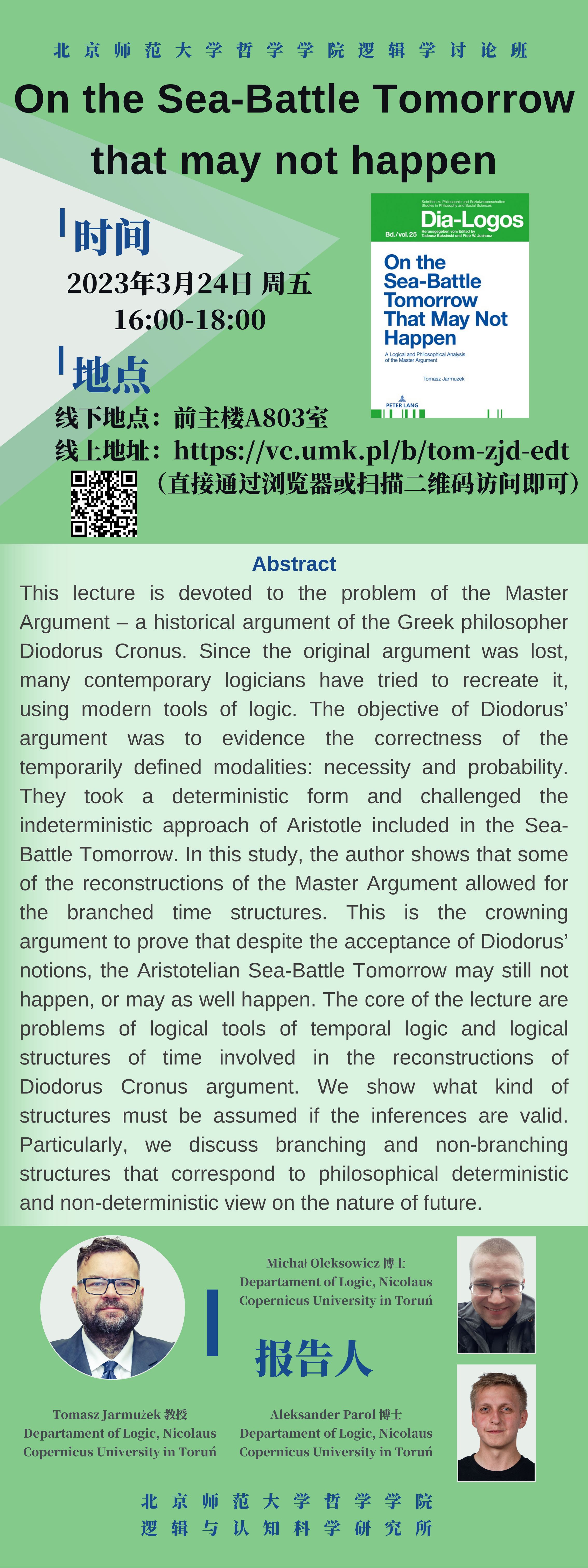Odczyt prof. Tomasza Jarmużka (wraz z współautorami) – On the Sea-Battle Tomorrow That May Not Happen
Organizers: Department of Logic
March 24, 2023
9:00-11:00
Tomasz Jarmużek
(Departament of Logic, Institute of Philosophy, Faculty of Philosophy and Social Sciences, Nicolaus Copernicus University in Toruń)
(Departament of Logic, Institute of Philosophy, Faculty of Philosophy and Social Sciences, Nicolaus Copernicus University in Toruń)
(Faculty of Theology, Nicolaus Copernicus University in Toruń)
Aleksander Parol
(Departament of Logic, Institute of Philosophy, Faculty of Philosophy and Social Sciences, Nicolaus Copernicus University in Toruń)
Link: vc.umk.pl/b/tom-zjd-edt
Abstract
This lecture is devoted to the problem of the Master
Argument – a historical argument of the Greek philosopher Diodorus Cronus. Since the original argument was lost, many contemporary logicians have tried to recreate it,
using modern tools of logic. The objective of Diodorus’ argument was to evidence the correctness of the temporarily defined modalities: necessity and probability. They took a deterministic form and challenged the indeterministic approach of Aristotle included in the Sea-Battle Tomorrow. In this study, the author shows that some of the reconstructions of the Master Argument allowed for the branched time structures. This is the crowning argument to prove that despite the acceptance of Diodorus’ notions, the Aristotelian Sea-Battle Tomorrow may still not happen, or may as well happen. The core of the lecture are problems of logical tools of temporal logic and logical structures of time involved in the reconstructions of Diodorus Cronus argument. We show what kind of structures must be assumed if the inferences are valid.
Particularly, we discuss branching and non-branching structures that correspond to philosophical deterministic and non-deterministic view on the nature of future.
This lecture is devoted to the problem of the Master
Argument – a historical argument of the Greek philosopher Diodorus Cronus. Since the original argument was lost, many contemporary logicians have tried to recreate it,
using modern tools of logic. The objective of Diodorus’ argument was to evidence the correctness of the temporarily defined modalities: necessity and probability. They took a deterministic form and challenged the indeterministic approach of Aristotle included in the Sea-Battle Tomorrow. In this study, the author shows that some of the reconstructions of the Master Argument allowed for the branched time structures. This is the crowning argument to prove that despite the acceptance of Diodorus’ notions, the Aristotelian Sea-Battle Tomorrow may still not happen, or may as well happen. The core of the lecture are problems of logical tools of temporal logic and logical structures of time involved in the reconstructions of Diodorus Cronus argument. We show what kind of structures must be assumed if the inferences are valid.
Particularly, we discuss branching and non-branching structures that correspond to philosophical deterministic and non-deterministic view on the nature of future.



